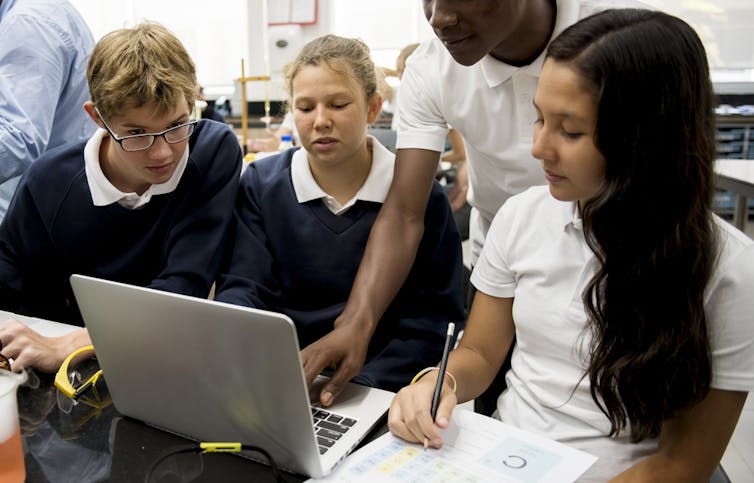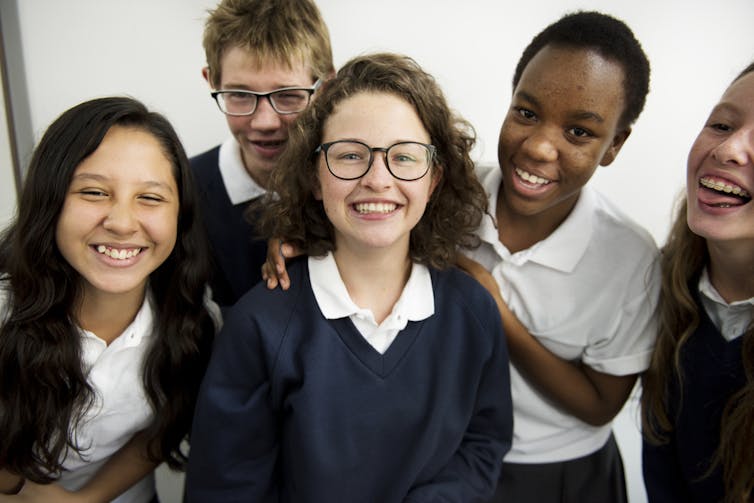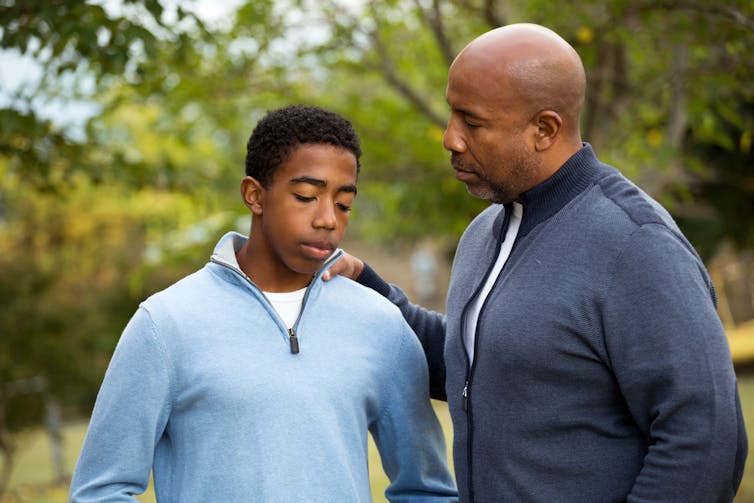Adolescence can be awkward. Here's how parents can help their child make and maintain good friendships
- Written by Michael Chambers, Lecturer, School of Education (Qld), Australian Catholic University
Secondary school can be a lonely place for adolescents who don’t have a best friend or a group of trusted friends. Young people will be more skilled in the art of making genuine friends (and keeping them) if they know how to be assertive, are optimistic about life, have some basic social skills and have a relationship with a parent/carer that includes honest talk.
Friendship troubles
Secondary school, in particular the junior secondary years, coincides with a time in life when young people are pushing new social and family boundaries. The transition to secondary school is especially demanding as once dependent kids become more independent in a new schooling order of new routines, new teachers, and new friends.
Young people can be cruel and unkind to each other and to adults in this stage of life. Being bullied, teased and left out are signs of friendship troubles. Understandably, victims of bullying feel less positive about the school environment.
Be assertive, not aggressive
Being assertive can help young people in not only sticking up for themselves, but it can also communicate to others a sense of self-assuredness. An assertive way of speaking and being can make young people attractive and more popular with peers.
Assertiveness involves polite but firm talk, eye contact, and controlled behaviour. It’s not to be confused with aggression which often takes the form of a raised voice, insults, put-downs and greedy behaviour.
 Good and assertive communication goes a long way.
from www.shutterstock.com
Good and assertive communication goes a long way.
from www.shutterstock.com
One way adults can foster assertiveness in young people is to encourage it in the safe environment of the home. Young people can practice assertive language and behaviour when they explain to siblings that their room is not a public thoroughfare, when they defend their right to use the bathroom by themselves but in a timely way, when they argue they need quiet and time alone to complete homework.
Optimism can lead to success
Grief and tears about friendships are inevitable in the secondary school years. At some stage, your child is likely to come home either sullen, withdrawn, crying or moody. They may even experience school refusal, which is when they refuse, or are reluctant about going to school.
An adolescent who has a positive mindset is more likely to bounce back into the usual routines of friendships. When a young person has a positive mindset, they tend to see setbacks and troubles as temporary. They identify them for what they are (specific, time-related issues) rather than for what they are not (global and eternal).
 Encouraging your child to talk about themselves positively at home can help them bounce back when things go wrong.
from www.shutterstock.com
Encouraging your child to talk about themselves positively at home can help them bounce back when things go wrong.
from www.shutterstock.com
That is to say, positive kids are more likely to identify a specific and reasoned account of friendship troubles (“Sally was mean to me today because she was in a terrible mood”) rather than a global and exaggerated account (“Sally is mean, she has always hated me”).
You can foster a positive mindset in your child by modelling and encouraging positive self-talk in the home. Expect your child to be looking forward to something each day at school. That might be catching up with friends, a particular class in school or even an exam or test!
Social skills and being genuine
Adolescents are more likely to fit in and make friendships if they are seen to be socially acceptable by their peers. Ask yourself if your child is comfortable with, and knows how to enter a group situation and greet friends. Does your adolescent mix with friends in the schoolyard during breaks? Does your child talk about their friendships at home? How many of your child’s friends do you know well?
Read more: Popular friends on social media can help save you from disasters
Poor social skills can lead to increased loneliness in adolescents.
Being cool is a strong driver for secondary students. But being authentic is even more appealing. Adolescents recognise and appreciate genuine and authentic people – even if the peer is a bit quirky and seen as an outsider. It’s also a good idea to make contact with teachers at your child’s school to ask about their perceptions of how your child mixes socially with their peers.
 Teens who have positive relationships with the adults in their life are more likely to have good relationships with their peers.
from www.shutterstock.com
Teens who have positive relationships with the adults in their life are more likely to have good relationships with their peers.
from www.shutterstock.com
Healthy relationships with adults
Children who have good and healthy relationships with adults are more likely to have good and healthy relationships with their peers. So, it’s important for you to foster a supportive relationship with your child. Try to be an encouraging parent who really listens to your child’s concerns. Your child will not expect you to have all the answers.
But it’s likely a listening ear and a measured and moderate response will be welcomed by your adolescent child. If your child perceives you to be fair, that will go a long way to establishing a solid relationship between adult and child. In turn, it will increase the chance your child will have good relationships with his or her peers.
Read more: Nice guys finish first: empathetic boys attract more close female friends
Adolescence can be tricky to navigate from a parent’s perspective. Making and maintaining healthy friendships is just one battle of the teenage years. Parental role-modelling, encouragement and seeking support from the school can make this aspect of the adolescent years rewarding and fruitful for many years to come.
Authors: Michael Chambers, Lecturer, School of Education (Qld), Australian Catholic University





